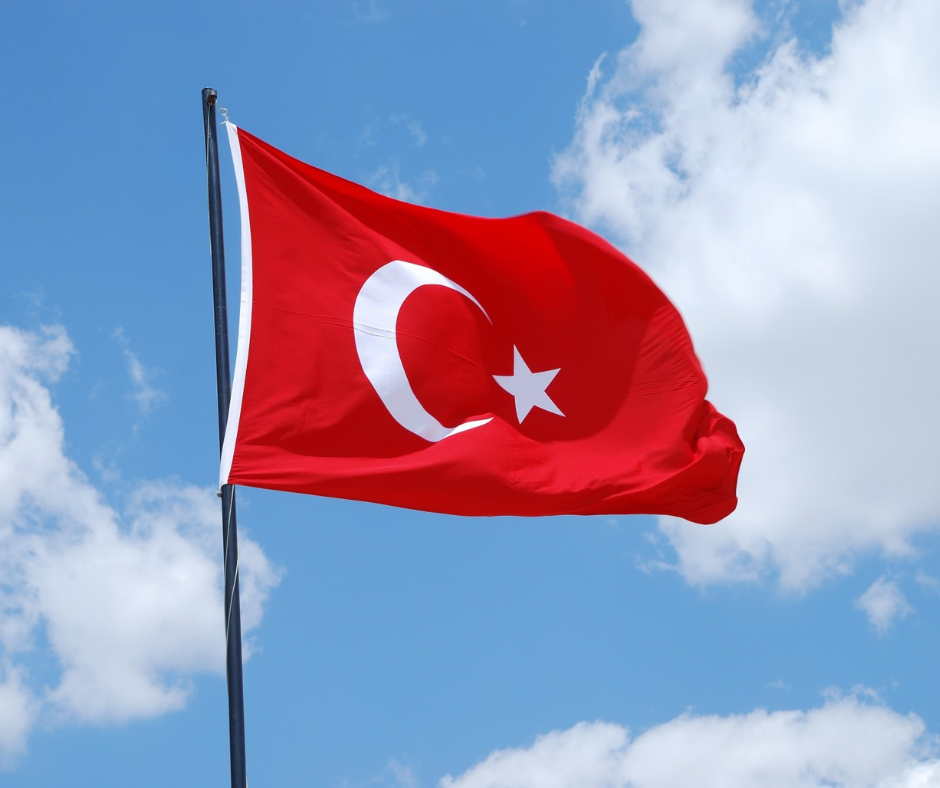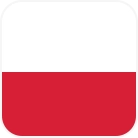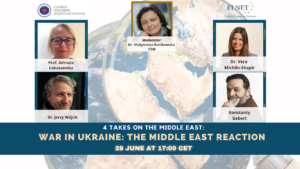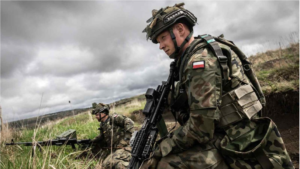
Turkey, which is one of the key member states of the North Atlantic Alliance, chose a “strategic autonomy” when confronted with Russia’s invasion of Ukraine. Turkish authorities condemned the war but also opposed the sanctions imposed by Europe and the United States on Russia. Turkish companies sell very effective military drones to Ukraine but at the same time Ankara is arranging negotiations between Kiev and Moscow on its territory. Turkey says it cannot give up its ties with any of the parties to the conflict.
Turkey depends on supplies of gas, oil and grain from Russia, but also on the millions of tourists from that country who spend their holidays on Turkish beaches every year. At the same time, Ankara maintains “friendly” relations with Ukraine, it has not recognized the illegal annexation of Crimea, and has restricted access to its straits for the Russian navy. Turkish authorities are using a kind of “realpolitik” tactics: they are bargaining with the West when it comes to Finland and Sweden’s membership in NATO, and simultaneously Ankara has said it is planning a new military operation in Syria. All this takes place in an atmosphere of a political campaign, because in 2023 both parliamentary and presidential elections will be held in Turkey. Meanwhile, the country’s economic situation is very difficult, inflation is skyrocketing and investment revenues are falling.
ECONOMIC CRISIS AND TIES WITH RUSSIA
Turkey has been going through the worst economic crisis in two decades so since President Recep Tayyip Erdogan ha been in power. The paradox of the situation is that President Erdogan led Turkey out of the economic collapse inherited from his predecessors and set it on a path of impressive growth and development in the first decade of the 21st century. Currently, however, the economic policy of the Turkish government is not necessarily helpful to deal with the economic downturn.
Economic indicators are alarming. Inflation hit over 70 percent in May 2022, the highest spike since 1998 and is likely to rise to 100 percent by July. To make matters worse, the value of the Turkish lira has decreased by 44 percent against the US dollar over the last year and now the US currency is worth over 17 lira. This has led to a huge increase of the cost of living, with a minimum wage in the private sector of around 4,200 lira and in the public sector on average below 7,000 lira. For many years, the engine of economic growth in Turkey has been its construction industry but galloping inflation and a huge increase in prices of building materials (124 percent) – has stopped new investments and is hindering the completion of already started. It appears that President Erdogan’s unorthodox beliefs concerning finances also have contributed to the spike in inflation and the fall of the Turkish lira. In Erdogan’s narrative, the higher the interest rates the higher inflation – which is not in line with what conventional economics says. For years, the Turkish President insisted that the heads of the central bank must cut interest rates which led to several resignations. The Turkish authorities, however, hope now that low interest rates can help Turkish exports and thus fuel the country’s industrial production and thus increase investment. This is to contribute to the creation of new jobs, the inflow of hard currency, and so to curb inflation and accelerate economic growth. So far, these hopes have not been materialised.
The challenges the Turkish economy has been facing were aggravated by the sharp rise in gas and oil prices in the fall of 2021, followed by the war in Ukraine. Turkey imports 99 percent of its gas and 93 percent of its oil supplies from overseas, of which 45 percent of natural gas, 17 percent of oil and 40 percent of gasoline come from Russia. In grain imports, 70 percent of wheat bought by Turkey comes from Russia, and 15 percent from Ukraine. Russia is also an important source of tourists for Turkey. 4.7 million Russians visited Turkey in 2021 and 7 million in 2019 – before the pandemic. Agri-food trade with both Russia and Ukraine is also vital for Turkey. Apart of that, Russia and Turkey also cooperate in nuclear energy. Russian state-owned nuclear energy giant Rosatom is building the Akkuyu nuclear power plant on the southern coast of Turkey in the Mersin province.
TURKEY’S REACTION TO THE WAR IN UKRAINE
Shortly after Russia’s invasion of Ukraine, Turkish President Recep Tayyip Erdogan announced that Turkey would not give up its interests in the region nor its ties with any of the parties to the conflict. He stressed, however, that the Russian invasion was “unacceptable”. The Turkish authorities have opposed the sanctions against Moscow and abstained from voting on the suspension of Moscow’s membership of the Council of Europe. However, Ankara backed the UN General Assembly resolution calling for Russia to immediately end its military operation in Ukraine.
Importantly for Kiev, Ankara recognized the conflict as a war which allowed it to restrict the movement of Russia’s navy through the Turkish Straits, referring to the Montreux Convention of 1936. When it comes to defence issues, before the war Ukraine purchased Bayraktar TB2 drones from the Baykar – a private Turkish company. The Kremlin protested, the more so as the next deliveries took place already after the outbreak of hostilities. However, the Turkish government argued that it was not a military aid but a contract between a private Turkish company and the government in Kiev.
Turkey has also seen an influx of over 100,000 Russians who left their country due to the war in Ukraine and the economic woes that it brought. More than 85,000 refugees from Ukraine have also found temporary shelter in Turkey.
The Turkish government justifies its stance on the war in Ukraine not just with its national interests. Its declared “balanced” approach allows it supposedly to conduct talks with both opposing parties and to create a platform for direct negotiations. Turkey’s diplomatic efforts include talks between President Erdogan and the leaders of Russia and Ukraine, as well as talks at the level of foreign ministers – including, for the first time since the war started, negotiations between ministers Sergey Lavrov and Dmytro Kuleba as part of the Diplomatic Forum in Antalya on March 10, 2022. Bilateral talks then continued in Istanbul. So far they have not brought any visible results in terms of stopping the war itself but Ankara has proved that it is an acceptable partner for both Kiev and Moscow for talks on resolving the economic issues arising from the ongoing war. This is Ankara’s great asset.
The Turkish government has also engaged with the United Nations in diplomatic efforts to unblock 23 million tons of grain in the port of Odessa to be safely exported through the Black Sea. This was the purpose of the talks of the foreign ministers of Turkey and Russia on 8 June in Ankara, which, however, did not bring any breakthrough. The war, and above all the Russian blockade and the mines of the neighboring sea strips, “trapped” the grain in the port’s silos. The grain exports from Ukraine and Russia is of key importance not just for the food stability in the Middle East and Africa but also for the political stability of both regions. Some countries import the bulk of the grain they need precisely from Russia or Ukraine. Egypt imports 82 percent of its wheat from Russia and Ukraine, and Somalia in the Horn of Africa as well as Benin in West Africa 100 percent. Also Sudan, Senegal and Tanzania import more than 60 percent of their wheat from that region. The problem goes beyond the Middle East or Africa, as Laos, for example, also buys over 90 percent of its wheat from Russia and Ukraine. In total – as the President of the European Commission Ursula von der Leyen said in the European Parliament on June 8, 2022 – the danger of starvation resulting from the Ukrainian war affects as many as 275 million people.
TURKEY – USA RELATIONS
In 2017, Ankara concluded an agreement with Moscow worth approximately USD 2.5 billion for the purchase of S-400 air defense systems. The first delivery took place in July 2019, and the deal itself led to serious tensions with the US administration of President Donald Trump. As a result, Turkey was removed from the prestigious project to build state-of-the-art F-35 fighter jets, and the Turkish defense industry was placed under US sanctions. The Turks participated in it since 2007 and planned to buy over a hundred of F-35 fighters. Washington argued that the S-400 were incompatible with NATO systems, and that Moscow could use them to obtain sensitive data on the F-35.
The war in Ukraine has added a new dimension to Ankara-Washington relations. The US authorities described the Turkish backing of Ukraine as “an important deterrent against harmful influences in the region.” According to the US Department of State, “appropriate US trade ties with Turkey in the field of defense serve the US national security as well as economic and trade interests” of the country. However, this does not change anything as regards the issue of S-400 air defense systems. In April 2022, the Turkish government announced that it could buy more S-400 units. Considering the geopolitical context, and above all the Russian-Ukrainian conflict, this can be interpreted as a signal to the Kremlin that the Turks intend to continue the existing relations with Russia.
However, this is also a kind of an attempt to put pressure on Washington. Back in October 2021, the Turkish government asked the Joe Biden administration for permission to purchase 40 F-16 fighters, which would to some extent offset the removal of Ankara from the F-35 project. It was only in March 2022 that the US government responded vaguely to this request in a letter to Congress, stating that a possible sale would be in line with Washington’s interests and would support NATO unity. In April, however, both countries launched a strategic mechanism of cooperation in the field of defence and economy, which indicates a step forward in the rapprochement between Washington and Ankara.
TURKEY’S NATO GAME
The war in Ukraine has also become an opportune moment for Turkey to ‘remind’ NATO of its strategic importance for the Alliance. The Scandinavian countries Finland and Sweden, concerned about the Russian aggression against Ukraine, applied for NATO membership on May 18, 2022. However, already on May 13, Turkish President Erdogan announced that his country could not positively evaluate these candidacies due to their “support for terrorist organizations”. He meant people who live in both countries and are allegedly associated with the PKK – Kurdistan Workers’ Party – an organization recognized as terrorist also by the European Union and the United States.
Turkey also does not accept that Sweden and Finland have sheltered people with links to the Hizmet – a movement initiated by Fethullah Gulen, a Turkish thinker and religious activist who has lived in Pennsylvania, USA since 1999. The Hizmet is an educational and religious movement that has founded thousands of schools in various parts of the world. However, Gulen’s supporters are accused by the Turkish authorities of orchestrating the failed coup in July 2016. Turkey recognizes Gulen’s movement as a terrorist organization but neither the United States nor the European Union countries share that view. Another bone of contention is the embargo imposed by Sweden and Finland on arms exports to Turkey in 2019, when the country carried out a military operation in northern Syria against the Kurdish People’s Protection Units – YPG. These forces are in control of the northeastern Syria (the so-called Rojava) and played a significant role in the fight against the Daesh. Importantly, the YPG are backed by Washington. Ankara, however, accuses them of having ties with the PKK, which, by the way, is not far from the facts.
At the end of May 2022, the Turkish authorities sent their demands to Finland and Sweden in writing, which include the cessation of “support” to the PKK and Hizmet, banning these groups from organizing events, extraditing people with links to PKK and Hizmet who are wanted by the Turkish authorities, backing Turkish anti-terrorist measures as well as lifting the embargo on arms exports to Turkey. Ankara’s demands are difficult to meet due to the rule of law and judicial independence in Sweden and Finland. However, for the enlargement of the North Atlantic Alliance, the unanimity of the member states is required, and therefore the consent of Ankara is necessary. It is hard to expect that this issue could be resolved before the NATO summit which is to be held in Madrid on June 29-30, 2022. Part of the solution would be perhaps larger Swedish and Finnish investment in Turkey. Both Stockholm and Helsinki seem to be moving in this direction.
Turkey’s game with the possible veto of Finland and Sweden’s NATO membership was a kind of prelude to the announcement of a new military intervention in northern Syria near the towns of Tal Rifaat and Manbij. This operation – the fifth one since 2016 – will probably focus on the Kurdish YPG grouping but is also aimed at “preparing” a place – a buffer zone – for the transfer of some Syrian refugees currently living on Turkish territory. The intervention in Syria itself, and above all the case of the four million Syrians who found refuge in Turkey, is of great political importance for President Erdogan due to the presidential and parliamentary elections to be held in 2023. This is a populist move to calm public sentiment in Turkey which is in the midst of an economic crisis with a galloping inflation. President Erdogan must also take into account the electorate of his coalition partner – MHP – the Nationalist Movement Party.
ANKARA’S POLICIES IN THE MIDDLE EAST
The Turkish stance on Russia’s invasion of Ukraine – refusal to back Western sanctions, maintaining ties and trade with Moscow, resulted in the Russian authorities expressing their “understanding” for Turkey’s concerns about security along the border with Syria. This contrasts with the disapproval of this military operation expressed by the US Secretary of State Antony Blinken and places the North Atlantic Alliance to which Finland and Sweden are aspiring in an even more difficult position.
On the other hand, however, “understanding” on the part of the Kremlin does not mean that the Russians are in favor of another Turkish operation in Syria. There has been an increase in the size of Russian and Syrian forces next to the territories that are to be covered by the Turkish offensive. Ankara is undoubtedly taking advantage of Moscow’s diplomatic isolation and its military operations in Ukraine – and on the other hand, efforts by Western partners to dissuade Ankara from vetoing Stockholm and Helsinki’s membership in NATO. In the case of Russia, the hope for a possible Turkish veto inhibits the Kremlin’s negative reactions to Ankara’s actions in Syria. Without Moscow’s ‘neutrality’, it would be difficult for Turkey to conduct a military operation in that country. Russia saved the dictatorial power of Bashar al-Assad with its intervention in 2015 and turned the tide of the war in his side. Although President Erdogan and Putin are on opposite sides of the barricade in Syria, they have managed to agree on the spheres of influence in that country. Therefore, now is the best time for Turkey to pursue its interests across the southern border in areas controlled by Kurdish groups who boast Washington as an ally.
TURKEY-GREECE TENSIONS
For Europe and the United States, a potentially more serious problem may be Ankara’s questioning of Greek sovereignty over islands in the Aegean Sea. A hundred years have passed since the Treaty of Lausanne which confirmed the borders between the two countries and, according to Turkey, also made Greece’s sovereignty over them dependent on their “demilitarization”. Ankara claims that Greece has systematically breached the treaty provisions, including the Paris Treaty of 1947, which confirmed the status of these islands, including Lesbos, Chios, Rhodes, Samos and Lemnos.
Allegations of “militarization” of the islands are rejected by Athens. Both sides submitted letters to the United Nations stating their positions on the islands and allegations of mutual airspace violations. Meanwhile, Turkish Foreign Minister Mevlüt Çavuşoğlu announced that “Greece should disarm these islands. If this does not happen, the sovereignty of them will be open for discussion.” It’s worth noting, however, that tensions between Athens and Ankara are a constant element in their mutual relations.
The upcoming 100th anniversary of the establishment of the Republic of Turkey that will be celebrated in 2023, and the precedent of a revisionist Russia’s invasion of Ukraine, make us seriously consider both the role of Turkey in NATO and what policy the European Union should pursue towards Ankara. Turkey is going through a pre-election year but for Europe and NATO of which that country is a key member state, it is primarily the time of Russia’s war with Ukraine. Neither the North Atlantic Alliance nor Europe need new sources of instability.
Author: dr. Bruno Surdel, analyst, Centre for International Relations
[evc_interactive_banner type=”classic” custom_link=”url:https%3A%2F%2Fmastersandrobots.tech%2F|||”]




